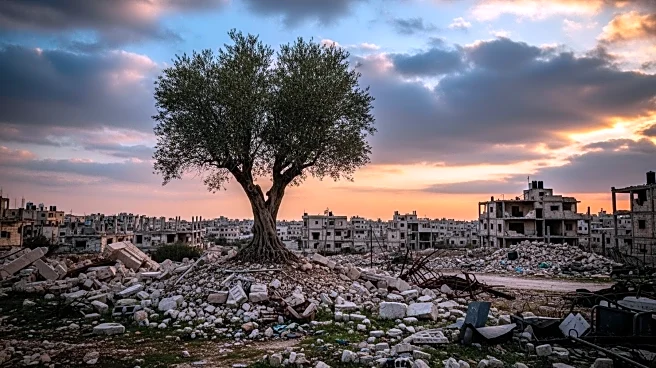What is the story about?
What's Happening?
Israel has ordered the evacuation of Gaza City as its forces prepare to capture the northern Gaza Strip, claiming operational control over 40% of the city. Despite Israeli assurances of shelter and resources in southern humanitarian zones, aid organizations report overcrowding and insufficient supplies. The International Committee of the Red Cross has criticized the evacuation plan as unfeasible. Israel plans to hand over new aid sites to the Gaza Humanitarian Foundation, with security provided by private U.S. forces. However, the UN reports over 1,100 deaths at GHF sites since May, raising concerns about safety and effectiveness.
Why It's Important?
The evacuation order and subsequent humanitarian challenges in Gaza City highlight the ongoing humanitarian crisis in the region. The overcrowding and lack of resources in designated aid zones could exacerbate the suffering of displaced populations. The involvement of private U.S. security forces in aid site management raises questions about accountability and the role of international actors in conflict zones. This situation may influence international perceptions of Israel's military strategies and humanitarian policies, potentially affecting diplomatic relations and aid funding.
What's Next?
As Israel continues its military operations, the situation in Gaza is likely to remain tense. The effectiveness of the new aid sites and the role of the Gaza Humanitarian Foundation will be closely monitored by international organizations. There may be increased pressure on Israel to ensure safe and adequate conditions for evacuees. The international community could call for more robust humanitarian interventions and negotiations to address the crisis and prevent further casualties.
Beyond the Headlines
The ethical and legal dimensions of forced evacuations and the management of humanitarian aid in conflict zones are critical considerations. The situation in Gaza underscores the need for international cooperation and adherence to humanitarian principles. Long-term, this crisis may prompt discussions on the role of private security in humanitarian operations and the importance of safeguarding civilian populations during military conflicts.














